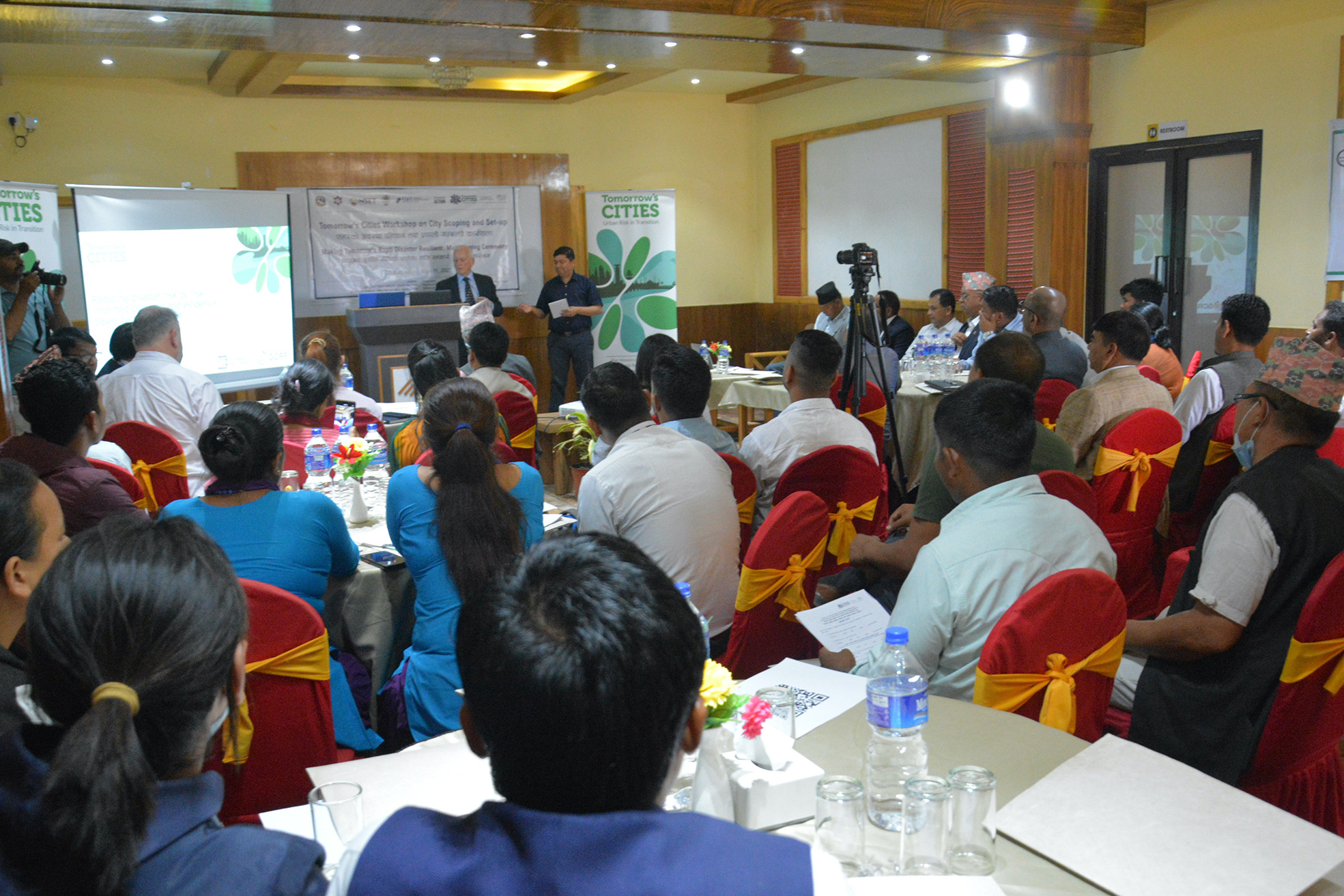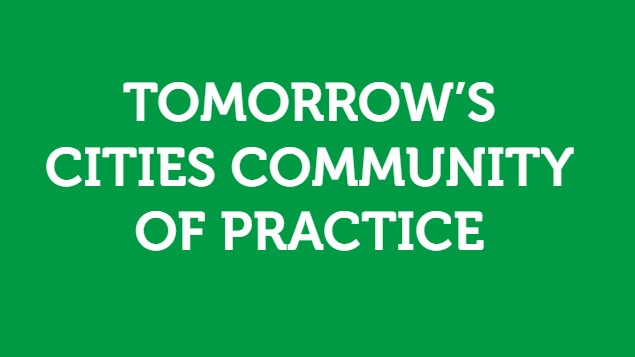
- Close
22/06/2023 | Rapti
Capacity Strengthening activites underway in Rapti, Nepal

Tomorrow’s Cities activities have commenced in Rapti city, the capital of Lumbini Province in Nepal.
The Provincial Government and three local governments, namely Rapti Rural Municipality, Gadhawa Rural Municipality, and Shitaganga Municipality, are working together with the Provincial Infrastructure Development Authority (PIDA) of Lumbini Province and Tomorrow’s Cities Hub to implement the Tomorrow’s Cities Decision Support Environment (TCDSE) amd ensure that the future Rapti is resilient in the face of disasters.
Tomorrow’s Cities, in collaboration with the Nepal national team consisting of the National Society for Earthquake Technology – Nepal (NSET), Institute of Engineering, Tribhuvan University (IOE/TU), South Asia Institute of Advanced Studies (SIAS), Practical Action Nepal, and the Nepal Development Research Institute (NDRI), under the guidance of Provincial Infrastructure Development Authority (PIDA) just started incorporating the Tomorrow’s Cities Decision Support Environment (TCDSE) into the development of the Lumbini Provincial Capital City (LPCC), specifically Rapti city.
To facilitate the adoption of TCDSE by cities and expand its usage, the institutionalization of the TCDSE through standardized capacity strengthening activities, such as training and awareness programs, is necessary. These activities enable cities and urban areas to adapt the framework to their specific scenarios and become self-sustaining. As part of this initiative, the Tomorrow’s Cities Decision Support Environment training course has been developed to provide training to professionals from various disciplines and institutions. The course also aims to standardize the inputs, processes, and outcomes of TCDSE.
The TCDSE serves as a sociotechnical framework that fosters risk-informed decision-making in an inclusive, pro-poor, and pedagogical manner. It facilitates the involvement of stakeholders from diverse backgrounds, giving voice to those usually excluded from disaster risk reduction discussions. Moreover, the TCDSE helps to democratize knowledge and tools related to disaster risk, which are typically concentrated in the hands of a few. Recognizing that all stakeholders have some expertise and varying levels of knowledge about disasters, the TCDSE encourages their contribution to risk-informed planning conversations. In Tomorrow’s Cities, such planning focuses on urban areas that are less developed and susceptible to expansion and growth.

Capacity Strengthening activities.
On May 11, 2023 the Provincial Infrastructure Development Authority (PIDA), and Tomorrow’s Cities Hub signed Memoradum of Understanding for collaborative efforts.
As a result, the Tomorrow’s Cities Decision Support Environment (TCDSE) has been launched in Rapti, and project activities are progressing in partnership with PIDA and Local Governments. Concurrently, efforts to strengthen capacities are being intensified.
Module 0 (M0)- City Scoping and Set-up:
Module 0 (M0) of the TCDSE training course, focused on City Scoping and Set-up, began with the Tomorrow’s Cities Workshop held in Rapti on May 11, 2023. The workshop, organized jointly by PIDA, Lumbini Province, Nepal, and the Tomorrow’s Cities project, saw the participation of approximately 60 individuals from PIDA, Rapti & Gadhawa Rural Municipalities, and Shitaganga Municipality. The aim now is to accelerate the process of making Tomorrow’s Rapti disaster-resilient.

Workshop on City Scoping and Setup in Rapti City / Photo: Tomorrow’s Cities
Module 1 – Future visioning
Module 1 of the TCDSE training course, focused on Future Visioning, was conducted through a 3-day online training session from May 17-19, 2023. The primary aim of this module was to equip participants with the knowledge and skills to implement the TCDSE’s approach and methods and deploying Future Visioning in their respective cities.
The training saw the active participation of over 30 individuals, including representatives from local governments, the Provincial Infrastructure Development Authority, schools, people’s representatives, and community frontliners.
The course module on Future Visioning covered several key aspects. It introduced the TCDSE and highlighted the role of Future Visioning in contributing to risk-informed urban planning. The methodology of connecting past and everyday life experiences to future aspirations was explained, utilizing the “Wheel of Urban Assets.”
The module outlined the steps involved in translating visions and aspirations into spatial terms and described the process of translating these aspirations into policy expectations. Lastly, it illustrated how the outputs of Future Visioning are linked to Visioning Scenarios.

Participants of M1 – Future Visioning Course conducted for Rapti City.
Module 2 – Visioning Scenario Development
Module 2 of the TCDSE training course focused on Visioning Scenario Development.
A 3-day online training course specifically for Rapti city was conducted from June 6-8, 2023. The course aimed to provide participants with knowledge on developing Visioning Scenarios based on policies, existing trends, and generated data.
The instructors from the Tomorrow’s Cities Hub led sessions that introduced the TCDSE and emphasized how Visioning Scenarios contribute to risk-informed urban development planning. They also covered topics such as the relationship between policies and aspirations, the development process of policies, the importance of disaster risk-sensitive land-use plans within the context of TCDSE, data generation and projection for future urban planning, approaches to Visioning Scenario Development, and the connection between the outputs of Visioning Scenarios and Multi-Hazard Impact Assessments.
A total of 26 participants from local and provincial offices, with various professional backgrounds attended.

Participants of M2: Visioning Scenarios Course conducted for Rapti City
What lies ahead for Rapti in terms of capacity strengthening?
NSET, the lead organization responsible for the Capacity Strengthening component of the Tomorrow’s Cities project, is currently consolidating the knowledge acquired from the conducted modules. They are also making preparations for the upcoming modules of the TCDSE course in Rapti, taking into account the feedback received from participants and instructors. The aim is to ensure that the subsequent modules are delivered in the most effective manner, with the anticipation of achieving the desired outcomes.



